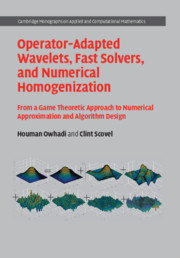 Operator-Adapted Wavelets, Fast Solvers, and Numerical Homogenization
Operator-Adapted Wavelets, Fast Solvers, and Numerical Homogenization Book contents
- Frontmatter
- Dedication
- Contents
- Preface
- Acknowledgements
- Reading Guide
- 1 Introduction
- Part I The Sobolev Space Setting
- Part II The Game Theoretic Approach
- Part III The Banach Space Setting
- 11 Banach Space Basics
- 12 Optimal Recovery Splines
- 13 Gamblets
- 14 Bounded Condition Numbers
- 15 Exponential Decay
- 16 Fast Gamblet Transform
- Part IV Game Theoretic Approach on Banach Spaces
- Part V Applications, Developments, and Open Problems
- Part VI Appendix
- Bibliography
- Algorithms
- Glossary
- Nomenclature
- Index
- Identities
15 - Exponential Decay
from Part III - The Banach Space Setting
Published online by Cambridge University Press: 10 October 2019
- Frontmatter
- Dedication
- Contents
- Preface
- Acknowledgements
- Reading Guide
- 1 Introduction
- Part I The Sobolev Space Setting
- Part II The Game Theoretic Approach
- Part III The Banach Space Setting
- 11 Banach Space Basics
- 12 Optimal Recovery Splines
- 13 Gamblets
- 14 Bounded Condition Numbers
- 15 Exponential Decay
- 16 Fast Gamblet Transform
- Part IV Game Theoretic Approach on Banach Spaces
- Part V Applications, Developments, and Open Problems
- Part VI Appendix
- Bibliography
- Algorithms
- Glossary
- Nomenclature
- Index
- Identities
Summary
This chapter establishes the exponential decay of gamblets under an appropriate notion of distance derived from subspace decompositionin a way that generalizesdomain decomposition in the computation of PDEs.The first stepspresent sufficient conditions forlocalizationbased on a generalization of the Schwarz subspace decomposition and iterative correction methodintroduced by Kornhuber and Yserentantand the LOD method of Malqvist and Peterseim. However,when equipped withnonconforming measurement functions, one cannot directly work in the primal space, but instead one has to find ways to work in the dual space. Therefore, the next steps presentnecessary and sufficient conditions expressed as frame inequalities in dual spaces that, in applications to linear operators on Sobolev spaces,are expressed as Poincaré, inverse Poincaré, and frame inequalities.
Keywords
Information
- Type
- Chapter
- Information
- Operator-Adapted Wavelets, Fast Solvers, and Numerical HomogenizationFrom a Game Theoretic Approach to Numerical Approximation and Algorithm Design, pp. 252 - 296Publisher: Cambridge University PressPrint publication year: 2019